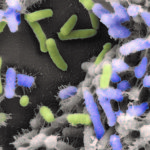Link to Pubmed [PMID] – 34689834
Link to DOI – 10.1186/s42523-021-00138-9
Anim Microbiome 2021 Oct; 3(1): 74
The gut microbiota influences host performance playing a relevant role in homeostasis and function of the immune system. The aim of the present work was to identify microbial signatures linked to immunity traits and to characterize the contribution of host-genome and gut microbiota to the immunocompetence in healthy pigs.To achieve this goal, we undertook a combination of network, mixed model and microbial-wide association studies (MWAS) for 21 immunity traits and the relative abundance of gut bacterial communities in 389 pigs genotyped for 70K SNPs. The heritability (h2; proportion of phenotypic variance explained by the host genetics) and microbiability (m2; proportion of variance explained by the microbial composition) showed similar values for most of the analyzed immunity traits, except for both IgM and IgG in plasma that was dominated by the host genetics, and the haptoglobin in serum which was the trait with larger m2 (0.275) compared to h2 (0.138). Results from the MWAS suggested a polymicrobial nature of the immunocompetence in pigs and revealed associations between pigs gut microbiota composition and 15 of the analyzed traits. The lymphocytes phagocytic capacity (quantified as mean fluorescence) and the total number of monocytes in blood were the traits associated with the largest number of taxa (6 taxa). Among the associations identified by MWAS, 30% were confirmed by an information theory network approach. The strongest confirmed associations were between Fibrobacter and phagocytic capacity of lymphocytes (r = 0.37), followed by correlations between Streptococcus and the percentage of phagocytic lymphocytes (r = -0.34) and between Megasphaera and serum concentration of haptoglobin (r = 0.26). In the interaction network, Streptococcus and percentage of phagocytic lymphocytes were the keystone bacterial and immune-trait, respectively.Overall, our findings reveal an important connection between gut microbiota composition and immunity traits in pigs, and highlight the need to consider both sources of information, host genome and microbial levels, to accurately characterize immunocompetence in pigs.
